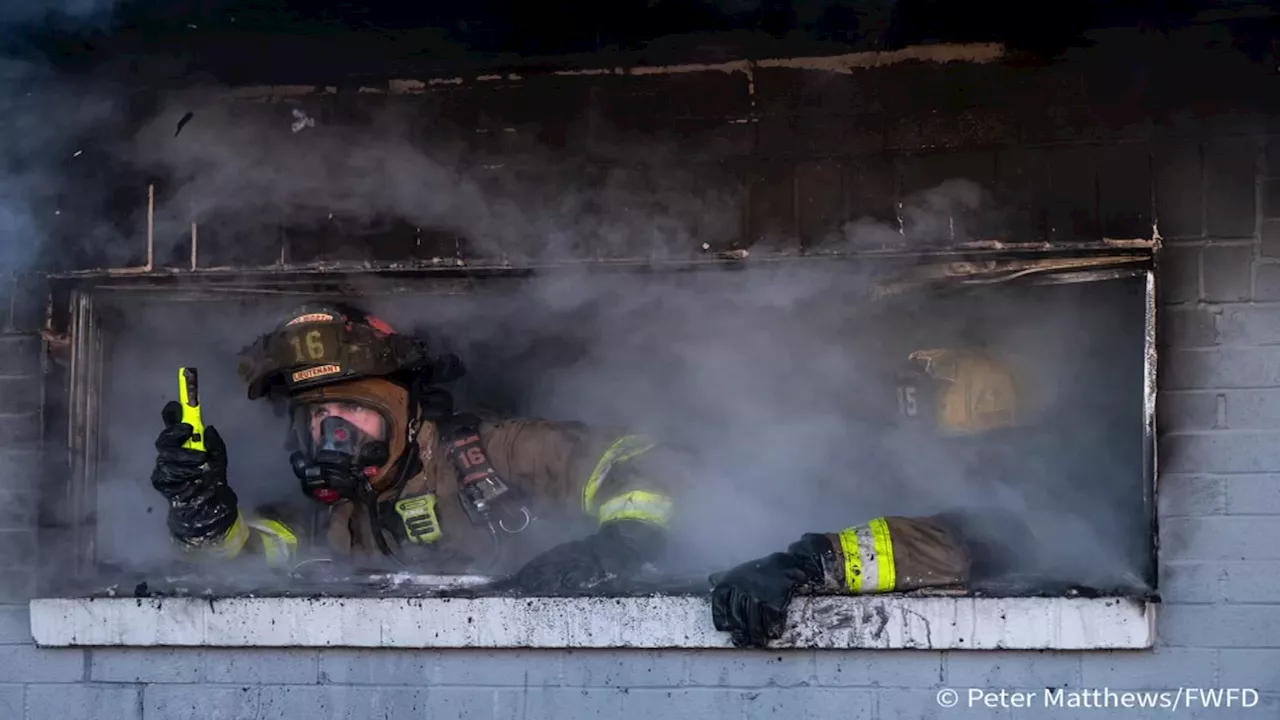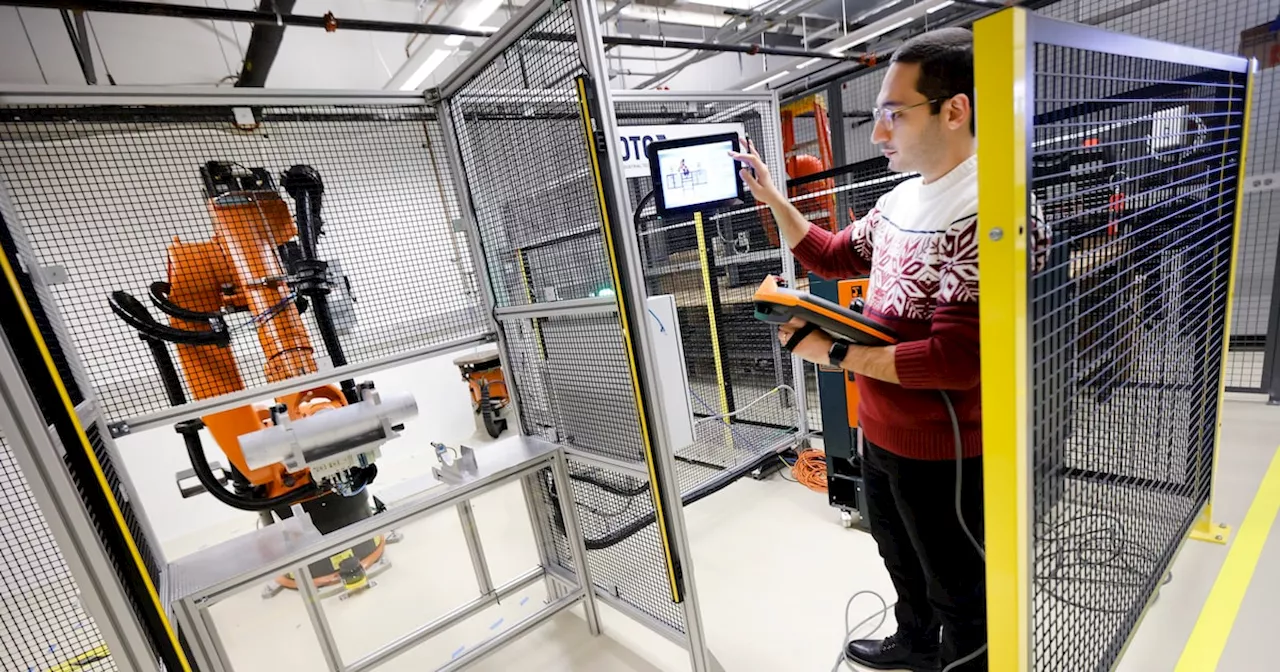Texas has witnessed a significant increase in the number of its universities achieving R1 research status, a recognition granted by the Carnegie Classification of Institutions of Higher Education. This signifies a major advancement in the state's research landscape, spurred by increased funding, private donations, and industry partnerships.
Mastoid Deylami, a mechanical engineering doctoral student at Southern Methodist University, demonstrates how an industrial robot performs as his research includes implementing AI in manufacturing. SMU obtained R1 status as a top U.S. research university, the latest in Texas schools to reach the Carnegie Classification.
After nearly two decades of concerted effort to bolster Texas’ standing as a go-to destination for top research universities, the state has significantly expanded the number of schools reaching the tier 1 status. Texas now boasts 16 institutions that are recognized as R1 research universities, according to the Carnegie Classification of Institutions of Higher Education announced Thursday. This classification is awarded to schools demonstrating significant spending on research as well as a high production of research doctorates. \The R1 status serves as a key driver in attracting top faculty, students, and even industries to areas. This, in turn, can lead to more grant funding and drive innovation as the quality of faculty improves, according to university officials. Texas leaders had long lamented that the state lagged far behind others in research schools, with only three Texas universities holding the R1 designation in 2008. A combination of state incentive funding, private donations, and industry partnerships helped more schools get closer to the mark. Then, the Carnegie Classification revamped its qualification process for this year’s designations, including eliminating a cap. The result is an expanded number of schools on track to reach the status. \Meanwhile, the state has new schools rising up to the R2 level, including Texas Woman’s University, East Texas A&M University in Commerce, and Abilene Christian University. Texas now has 16 schools with that designation, with 139 institutions nationwide receiving it this year. The top status had been based on a sliding scale that included 10 metrics and had a cap on the number of schools receiving it. Now, R1 schools have a clear threshold to meet. They must have more than $50 million in total research spending and 70 research doctorates awarded annually. The new system also means more institutions focused on health – such as UT Southwestern – could now qualify for the status. Previously, many university-associated medical centers missed the mark despite spending hundreds of millions of dollars on research. R2 schools must meet a threshold of more than $5 million in research spending and 20 research doctorates awarded annually. This is a new designation that identifies research happening at schools not historically recognized that spend more than $2.5 million on research annually. Doctoral degrees are not a factor. Ten Texas schools received this status, including the University of North Texas Health Science Center in Fort Worth. The University of North Texas in Denton is among 16 schools in the state that have the R1 designation as a top research school. \A 2009 Texas law spurred a race for research funding as it created a major incentive for public universities. Schools that reached a Texas Tier One designation because of their investment in research – including by growing endowments – could then tap millions through the state’s National Research University Fund. That fund was approved by Texas voters to support emerging research institutions. Private universities could not qualify for such dollars and relied on other means, including partnering with companies or public universities on projects. For this year’s status, the American Council on Education, or ACE, and the Carnegie Foundation for the Advancement of Teaching revamped how schools are classified to more accurately reflect work on campuses and to minimize the unwarranted competition between schools, officials have said. “Before these updates, it was not clear what was required for institutions to earn a research designation,” Mushtaq Gunja, executive director of the Carnegie Classification systems and senior vice president at ACE, said in a statement. “This confusion created distractions and unproductive competition between colleges and universities.” \The DMN Education Lab deepens the coverage and conversation about urgent education issues critical to the future of North Texas. The DMN Education Lab is a community-funded journalism initiative, with support from Bobby and Lottye Lyle, Communities Foundation of Texas, The Dallas Foundation, Dallas Regional Chamber, Deedie Rose, Garrett and Cecilia Boone, The Meadows Foundation, The Murrell Foundation, Ron and Phyllis Steinhart, Solutions Journalism Network, Southern Methodist University, Sydney Smith Hicks and the University of Texas at Dallas. The Dallas Morning News retains full editorial control of the Education Lab’s journalism.Eva-Marie Ayala is a veteran education reporter focusing on how local and state policies impact school children. Previously, she reported for her hometown paper the Fort Worth Star-Telegram. She is a national board member for the Education Writers Association
TEXAS UNIVERSITIES RESEARCH FUNDING CARNEGIE CLASSIFICATION R1 STATUS HIGHER EDUCATION
United States Latest News, United States Headlines
Similar News:You can also read news stories similar to this one that we have collected from other news sources.
 Texas businesses going to bat for Texas schools with 'Fund Schools First' initiativeA new business community coalition is working with school districts to lobby for full funding, instead of against vouchers.
Texas businesses going to bat for Texas schools with 'Fund Schools First' initiativeA new business community coalition is working with school districts to lobby for full funding, instead of against vouchers.
Read more »
Texas Schools Face Surge in Dyslexia Cases, Embracing Innovative SolutionsTexas schools are grappling with a significant increase in dyslexia diagnoses, prompting a shift towards specialized instruction and innovative approaches. The article highlights the challenges faced by educators and administrators in meeting the needs of this growing population, while showcasing the positive impact of early intervention programs like Celebrate Dyslexia Schools.
Read more »
 Cold Snap Fuels Surge in House Fires Across North TexasA severe cold snap in North Texas has led to an alarming rise in house fires, with cities like Fort Worth and Dallas reporting a significant increase in fire calls. Fire officials attribute the surge to people using unsafe heating methods, such as utilizing stoves or placing space heaters too close to flammable materials. Tragically, two individuals lost their lives in a Dallas house fire on Monday, highlighting the dangers posed by improper heating practices.
Cold Snap Fuels Surge in House Fires Across North TexasA severe cold snap in North Texas has led to an alarming rise in house fires, with cities like Fort Worth and Dallas reporting a significant increase in fire calls. Fire officials attribute the surge to people using unsafe heating methods, such as utilizing stoves or placing space heaters too close to flammable materials. Tragically, two individuals lost their lives in a Dallas house fire on Monday, highlighting the dangers posed by improper heating practices.
Read more »
 Schools Close Nationwide Due to Surge in Flu and IllnessSchools across the US are closing temporarily due to a surge in influenza and other seasonal illnesses. The closures, reminiscent of the COVID-19 lockdown era, are primarily attributed to the high number of sick students and staff. While most closures are short-lived, lasting only a few days, the situation highlights the severity of this year's flu season.
Schools Close Nationwide Due to Surge in Flu and IllnessSchools across the US are closing temporarily due to a surge in influenza and other seasonal illnesses. The closures, reminiscent of the COVID-19 lockdown era, are primarily attributed to the high number of sick students and staff. While most closures are short-lived, lasting only a few days, the situation highlights the severity of this year's flu season.
Read more »
 US Schools Shutting Down Amid Surge in Flu and Other IllnessesThe United States is experiencing a significant surge in influenza and other seasonal illnesses, leading to temporary school closures in several states. The closures, reminiscent of the COVID-19 pandemic, are primarily driven by the high number of sick students and staff, and experts anticipate that the flu season will continue to intensify for several weeks.
US Schools Shutting Down Amid Surge in Flu and Other IllnessesThe United States is experiencing a significant surge in influenza and other seasonal illnesses, leading to temporary school closures in several states. The closures, reminiscent of the COVID-19 pandemic, are primarily driven by the high number of sick students and staff, and experts anticipate that the flu season will continue to intensify for several weeks.
Read more »
 US Schools Closing Due to Surge in Flu and IllnessesSchools across the United States are temporarily closing due to high rates of influenza and other seasonal illnesses. The closures, lasting a few days, are aimed at slowing the spread of the virus and protecting students and staff. Flu activity is high nationally, with pediatric flu deaths reported. Experts say the peak of the flu season is yet to come.
US Schools Closing Due to Surge in Flu and IllnessesSchools across the United States are temporarily closing due to high rates of influenza and other seasonal illnesses. The closures, lasting a few days, are aimed at slowing the spread of the virus and protecting students and staff. Flu activity is high nationally, with pediatric flu deaths reported. Experts say the peak of the flu season is yet to come.
Read more »
